Deborah Soderholm married at 19 and was widowed at age 30 when her husband died from suicide. She continued her beloved teaching job as she waded through shock and grief, but chose to look to the future and vowed not to let the experience be a dark cloud over the lives of her two daughters. Deborah eventually reconnected with her “Superman,” a family friend whose wife died of leukemia, leaving him with two small children. They married and she became a stay-at-home mom to their blended family, for the first time in nine years. Deborah’s guiding philosophy now is to seize the day by developing talents and pursuing passions that create joy.
How did you meet Red Hawk?
I met Red Hawk when I interviewed him for a paper I was doing on Native Americans. I met him here in Williamsburg when I was only 18 years old. He was larger than life and full of generosity. There is no one like him. He was handsome, talented, and friendly to everyone. We were married for 11 years. We were going through some marital problems and I never thought that I would experience such a nightmare. I honestly didn’t know he was mentally ill until after he died. I didn’t see the signs then and I discovered too late to do anything. He died from suicide on November 25, 2011. We learn in support group that we don’t say “committed suicide.” It is an illness just like anything else but it affects the mind. He was in a very dark place, but I never thought that he would hurt himself. So when he did, it was an extreme shock to me and my family. He left me and our two beautiful daughters who were three and six at the time.
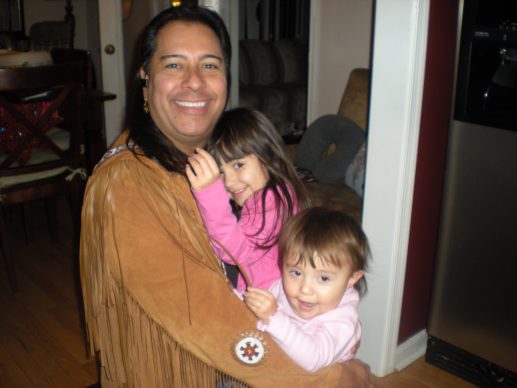
Deborah’s two daughters with their father, Red Hawk
What were the circumstances surrounding his death?
We were apart over Thanksgiving weekend… apparently, he had planned out his entire suicide, his exit to the other side. I’ve never come across any other story, when I meet people who are survivors of suicide loss, quite like mine. He went to our ward building and had called members of the bishopric and said he was going to hurt himself and somehow between that conversation and when they arrived he had already taken his life. . He had packed up all of his clothes and gotten them out of our home. He had thought of everything so that I wouldn’t be the one to find him. I still to this day don’t know how the bishop and counselor have dealt with this because there was very little contact with them afterwards.
I found out when police came to my door. I was at my parents’ at the time. I was screaming, and my mother was behind me and grabbed me and I remember her holding me for hours. I don’t even remember sleeping that night. The next day, I remember thinking that my girls’ lives are changed forever and I didn’t know what to do. I didn’t know what to say. I was in shock. I was so in shock that I developed a stutter for a week, and I’ve never stuttered in my life. I think my brain couldn’t comprehend that he was gone.
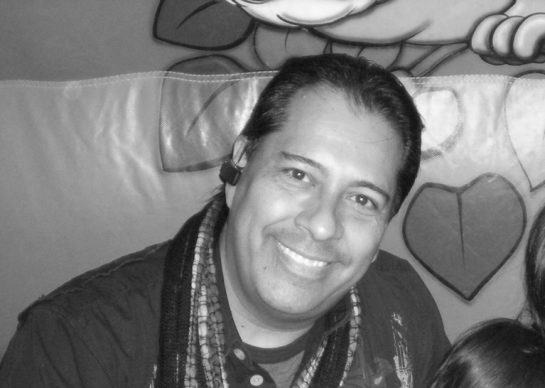
Deborah’s deceased husband, Red Hawk
Another member of my parents’ ward who is a therapist came over and helped me figure out what the narrative would be. You can’t lie to children in a situation like this. Later that day I told the girls. The hardest thing I had to do was tell them that their daddy had died and that his brain was sick. That’s how we framed it. As they’ve gotten older, I’ve told them a little bit more to the story as it’s come up.
What was the grieving process like for you? What were your emotions?
Grief is a very hard thing to bear. I feel like it’s this thing that you carry and it hits you and you have no control over it. I got connected with a grief counselor, which was tremendously helpful because she helped me work through these feelings and the spontaneous crying. How to deal with the fact that it’s ok to be sad and things are going to be different and every first is going to sting without him. So it’s hard. People at church brought some meals but I didn’t go to church immediately afterward, I would say I took a little break. Not that I didn’t want to go to go to church, but it just didn’t feel right.
It’s like an explosion in your life. You’re trying to pick up the pieces as you’re healing and dealing with things. I felt like I was continually getting punched in the gut or felt like I had a wound that kept getting ripped back open as I dealt with the aftermath I became a widow at the age of 30 and I had my girls to take care of. Throughout all of that, my priority was the girls. I thought, “I will not let this be a dark cloud over our lives. I want them to not suffer from this.” For many people, surviving the loss of a loved one to suicide becomes all-encompassing. So they, my girls, got me through.
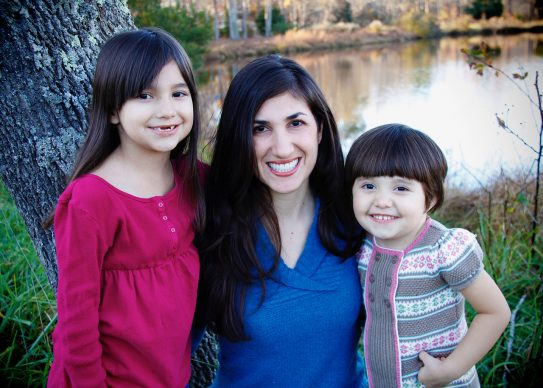
Deborah and her daughters
I also continued to work. I was teaching at a private school in Maryland and I only missed two weeks of work. I went back after the Christmas break. I remember crying that first day back, because everything was still going on, but everything felt different. So I threw myself into teaching and work and that was a great community. I think my church family still didn’t really know what to do. After a while I said to them, “I don’t like having dinner in my home and sitting down at the table with my girls because there’s an empty chair, and I have to be reminded of that every single dinner.” I would eat standing up and let the girls sit down and eat. I said, “Can you please invite us over for dinner? We want to be with people.” So they did that. One sister, just a couple weeks after he died said, “Come sing with me at a nursing home.” She played the piano and I would sing carols because I love to sing. That helped. That was a distraction.
There was a while, a long time where I didn’t feel like praying. Not that I was mad at God, because not once did I ever blame God for this. I knew this was not Him, this was other dark forces and mental illness. I just couldn’t bring myself to connect to things on the other side. But yet, I never lost my faith in Heavenly Father helping me through it. So even though I wasn’t really going to church, I felt Him carry me through a lot of the aftermath.
Tell me more about how you supported the girls. What are some of the things you did to make life seem more “normal”?
I got grief books for kids and we would read them and try to talk about death. For each of these things that I would do, I would be thinking “I can’t believe I have to do this.” Everything was so sad and new and unbelievable. I enrolled my oldest daughter in a camp for children who had lost a parent and she learned some coping techniques. They did some really great exercises at the camp like lighting a candle or making a memory book and releasing balloons. Those are things we’ve continued to do over the years. They have special books with pictures of their daddy and them. I don’t want them to ever forget him and how much he loved them, because he really did. We visit his grave a few times a year. As things come up, we talk about them in a healthy way. I don’t shy away from that. But everything is age appropriate. We also went on some nice vacations together, just to get away. We took a trip out West to the Grand Canyon, visited friends and family, and made new memories together. We still do special trips. Now we do trips as a big family.
At what point did you know that you wanted to get remarried?
I was only 30. I thought that I would like to get married again down the road. I wanted to have a family, but I didn’t really have a timeline on it. I was just trying to find peace for about a year afterwards. I made a lot of decisions on my own that I had never made before. It felt like I had taken care of the girls well, and I had a good job. But I do remember asking and praying for a Superman. I remember saying to my kids and sister, “I need a Superman. Someone who’s going to understand what I’ve been through and who gets it but who’s going to be there for me. I just need a great guy, who is good at everything.” When I said I prayed for Superman, the night I met up with Patrick for the first time, and I hadn’t seen him in like 10 years, he was wearing a Superman shirt and a Superman belt buckle. it’s just very fitting for him because he’s such a strong person and so wonderful. And he is good at everything he does!
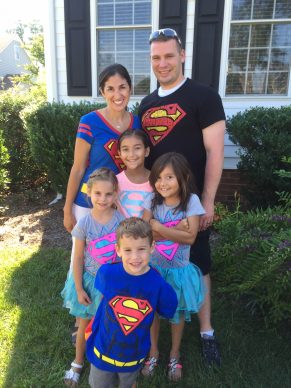
How did you meet (now-husband) Patrick?
That was a process of getting reacquainted with someone I already knew, but never thinking he would become my husband. My sister called and told me that Patrick’s wife had passed about 6 months prior. He had moved back to Williamsburg with his two little ones and he was really grieving. She said since I had been through the loss of a spouse, I should probably call him because I could relate to him more than anybody else. He had been friends with my brother, and I had been friends with his brothers. So I called him and we talked and he was able to release a lot of things and I understood a lot of things he was talking about. I think it was very therapeutic, and I eventually went down to Williamsburg. I had been in Maryland this whole time and we decided to get together and talk some more. We found that we had a really strong connection, and over the course of a few days we both felt that in some way we were led to each other. That he was an answer to my prayer, and he felt like we were being helped from the other side. We may have initially connected because of our heartbreaking experiences, but it became so much more and so much better than I could have imagined.
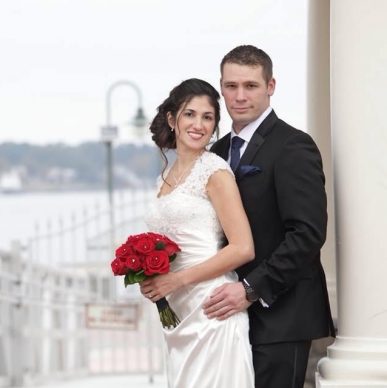
Deborah and Patrick
How did it go, introducing Patrick and your kids to each other and introducing the idea that this could be a new family?
It was about a year before we got married. His kids were younger, a girl and a boy. They were three and about 19 months when we began dating. Patrick’s wife passed away from complications with leukemia when the youngest was only 11 months old. It was a little crazy and a little hectic. I fell head over heels for Patrick very quickly, and so did he with me. And then we went, “Oh my gosh we have four kids between us. How do we do this?” So we were dating back and forth every weekend and bringing kids and going, “All right, let’s test this out. Let’s see if we can handle four kids on an outing in Washington D.C. Ok, we can do this.” It was a little bit more of a challenge when we got married. Bringing our families together and realizing how difficult that would be. That just led to a whole other host of challenges that have nothing to do with anything we had been through before.
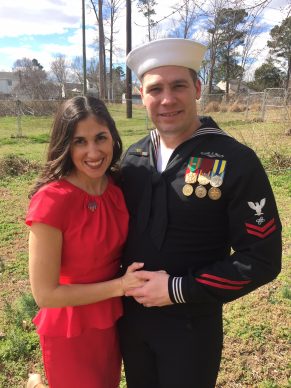
My two girls were the older ones, his were little. When we got married, both of us made enormous changes to our lives so that we could be together. I left my dream job teaching to move to Williamsburg because this is where all of our families are. He was in the Navy and got a special assignment in Yorktown, which is close to Williamsburg, so that he wouldn’t be deployed or go off to sea. Essentially, the decisions were that if we want to be with each other, we need to be there for our children because of what they’ve been through and the losses they’ve had. He had already missed a lot of their lives because of the Navy, although the Navy was very good to him. So, the big decision was, “Once he gets out of the Navy, what’s he going to do?” I decided to stay home and became a stay-at-home mom for the first time after working for 9 years.
We decided to just go full speed ahead to say, “I’m mom, he’s dad.” We don’t really refer to them as step-children. I sometimes say my “bonus children.” But if people ask me “How many children do you have?” I just say, “We have four,” and they go “Oh wow, that’s a lot of kids,” and I never really get into it. I then might say, “We’re a blended family.” I had to come to think of myself differently as a mom to four kids. And to being a stay-at-home mom during potty training and tantrums with children who weren’t my flesh and blood. It took an enormous amount of patience and energy to bond and come around. You have to open your heart so much.
My bonus children are very different than my two girls in so many ways, I would say it took the other side of my brain to parent them. Patrick and I had a lot of talks about parenting the first year or two we were married. My girls were a little bit more easy to handle, but they had to get used to having little siblings. We work really hard on putting family first so that the kids have a good home environment where they know they’re safe and loved. I feel like Patrick and I both have given up equal things. Now he’s out of the Navy and we were blessed he found a great job in the area. We’ve settled into a beautiful home. We’re not going to move anytime soon. And we’re doing really well.
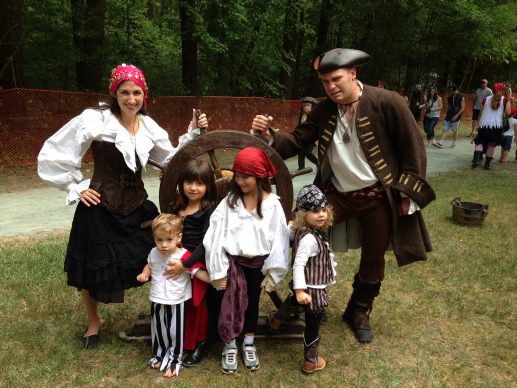
Because your girls were older, were they a little more hesitant to call Patrick “Dad,” or engage in that way?
We didn’t put any pressure on them to have them call him “Dad.” They called him Patrick for a while, but now they call him Daddy. And that means a lot, but we never put the pressure on them. Patrick’s kids, they just called me mommy. Patrick is very patient and so good with them. We lean on each other to help parent all of the kids.
It’s a very heavy responsibility to be their mom. Not to diminish anything that fathers do, but if I am impatient with them or I don’t feel like I give my all, in the back of my mind is, “Well, their mommy can’t kiss them goodnight. Their mommy wishes she could be here to hug them, so I should never not do that.” It’s a lot of pressure. I don’t know if it’s real or I just put it on myself to make sure they’re ok because they lost their mom so young and they’re mostly only going to remember me. When people ask me, “How is it with four kids?” I’m like, “Well it’s really hard. Even though their biological dad is in the house, and with my girls, it’s their biological mom in the house, it’s not as simple as, “Ok, now you’re a family because mommy and daddy are married.” It takes a lot of work.
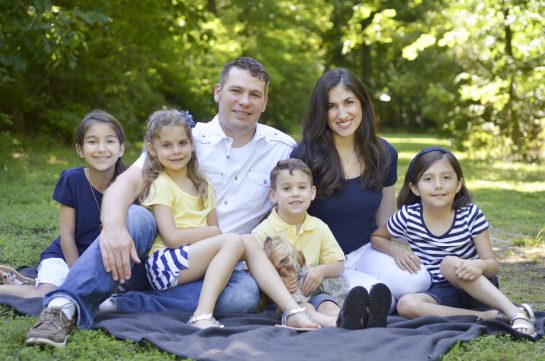
What’s your philosophy guiding your family life? How do you honor the ones who have passed, yet celebrate the family you have now?
We like to find things that connect them to their parents that have passed. Patrick’s daughter dances ballet and her mom was a dancer. She goes to the same studio that her mom taught and danced at and it’s a great way to connect with her mom. Patrick and I danced together in the Nutcracker with her in the same show, which was a really nice way to honor her mom. I hope that’s something she keeps doing. My oldest is 11, almost 12 now. She and I do theater, but her dad also was a performer. She’s done some film work in a show with Native Americans and that was a great way for her to connect with something her dad did as well. In school when they do Native American month, my girls will take in and share pictures of their dad or music that he produced. Patrick’s son is still a little guy, but we’re working on him! Patrick’s daughter will look up and see a pretty sky and say, “That’s my mommy up there,” and we say, “Yeah, that is.” When they have those memories or thoughts of them, we don’t ever stifle that.
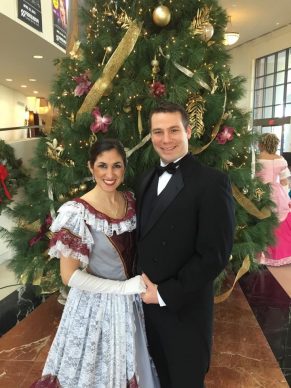
Do you bring up the other parents in conversation or do you just take it as it comes naturally?
Mostly naturally. But from time to time I’ll check in and ask, “How are you doing?” For instance, my oldest had to do some sort of project about her life up until now and she purposely left out her dad Red Hawk. In our household we’ll say “Daddy Red Hawk” and “Daddy Patrick” to differentiate. Or I’m Mommy and then there’s “Mommy Leah.” Anyway, she didn’t put her Daddy Red Hawk in her project. I wasn’t upset but I asked her, “Why didn’t you? It’s kind of part of your story.” She replied, “I don’t want my friends asking me about him and how he died.” That made me emotional, but I got it since she’s 11. She’s not quite ready for that explanation. You don’t want to stand out.
I don’t think a day goes by that I don’t think about Red Hawk, what we’ve been through, or Patrick doesn’t think about Leah. It’s a reminder of how blessed we are right now and that we don’t take anything for granted. Our threshold of what is an inconvenience or what bothers us is really high. It’s kind of a thing in my family where we’re like, “Oh, there’s a problem? Well, nobody died.” It sounds kind of morbid, but that’s the comparison. We’ve been through so much, I can get through anything. Small problems are nothing. As I go through life, when I greet people, I look them in the eye. I talk to people and I want to really listen and be aware of what people are going through. We don’t sweat the small stuff. As a family, we are more about having experiences rather than stuff, and really spending time together. We are also hopefully more compassionate towards people and their situations. We mourn with those that mourn, because we’ve been through it.
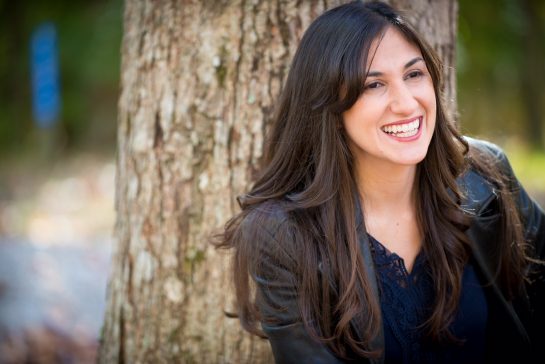
How has being back in Williamsburg helped you?
Williamsburg is a really special place. It is where I met Red Hawk, it is also where I met Patrick and his family. We are surrounded by so many grandparents, aunts, uncles, and cousins that I feel like I am where I am supposed to be. It’s great for us and the kids. We have lots of babysitters so we can have date nights! I’ve been able to create a sense of community here. I’m involved in the history community, I’m involved in the theater community.Patrick and I have done community theatre together! My philosophy since this happened is to seize the day, and I’m trying new things that I’ve never tried before. I’ve been pursuing passions that I’ve always wanted to, like singing and performing. I still get to pursue my passion, which is history. I was a Social Studies teacher so I found some great volunteer opportunities. I’m just doing things that bring me joy.
How have you found joy after this traumatic experience?
I seize opportunities. I like going to see inspiring performances and shows, and I love good, uplifting music. My favorite group is The Tenors and I love Josh Groban. I’ve done some background work in a film because it was on my bucket list.. I said, “Oh I want to sing the National Anthem at an event,” and that happened. Honestly, when I’ve put things out there, things have happened and I can say that I truly believe that I’ve been blessed from the other side.
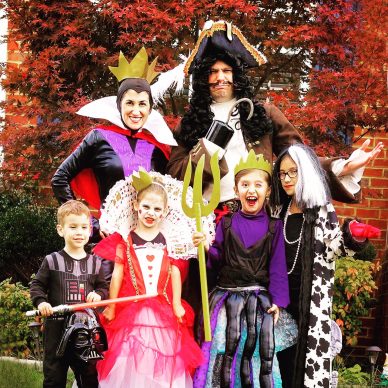
I feel like Patrick and I have been extremely blessed and given everything that we need, particularly each other. Everything along the way has fallen into place for us, and that hasn’t gone unrecognized by me because every day I count my blessings. Someone who’s been through what I’ve been through might think, “You have a reason to be angry or depressed.” But I’m not looking back, I’m looking forward. We’re just in a really great place and I hope it continues. But in the back of my mind is, “What if the rug gets pulled out from under us again?” I think when you go through a tragedy it means it’s always in the back of the mind. So we look for things that bring us joy and we just do it and I find that when I put good things out there, they come back to me. Another effect of going through something that’s so traumatic is that I have developed some anxiety, and that’s no fun. I’ve learned what my triggers are and try to minimize it when it happens, but it does happen from time to time.
How much of a role has counseling or therapy played in your healing?
Immediately after Hawk died, I went to a grief counselor, which I would recommend to anyone who goes through something like the sudden loss of a loved one. I also saw a therapist to work through, “Now what? What’s the next step?” This was all before I reconnected with Patrick. So I am a big advocate of therapy. I had never been to a therapist before, but going through something like this really warranted it and it helps you reframe some of your thinking and work through the trauma. Patrick and I also attended a few therapy sessions before we got married to talk about some of these big issues of grieving a spouse and joining our families together. So that was really helpful.
What role did your faith play in these experiences? Everything from Red Hawk’s death to your meeting Patrick, joining families, this whole healing process. How has it grown? Did you discover different aspects of it? Has the Atonement come to mean something different to you?
I feel like Heavenly Father never left me alone, or else I would not be able to talk about this the way that I do and have gotten through what I did. I never felt alone, even in my darkest hours when I was on the floor bawling my eyes out at midnight and then getting up the next morning and going to work with puffy eyes. I knew that my Savior understood and was there for me as well. I think the Atonement helps me look at Red Hawk and try to grasp what he must have been going through to make that decision to end his life and struggling with mental illness and the darkness that he felt. I know now more than I ever did that the Adversary is real. And that’s not a great thing to know, I guess, but I know it. It helps me try to combat that in our home by making sure that we are listening to the Spirit and seeking things that are going to bring the Spirit and light into our lives.
I still don’t fully understand or don’t know how to fully frame Red Hawk and what will happen to us in the afterlife. We were married in the temple and I haven’t had those questions answered yet. Patrick and I were married civilly, in a really great, fun wedding that we planned. That’s something that Patrick’s concerned about as well: What will happen to us? Patrick and I are active in church and our callings. We feel like we want to be examples to others to say, “You can do it. You can get through.” We’re very grateful for our blessings. We’ve only been married three years and we have a marriage where we look toward eternity, but we don’t really know what’s going to happen. We take every day as a gift.
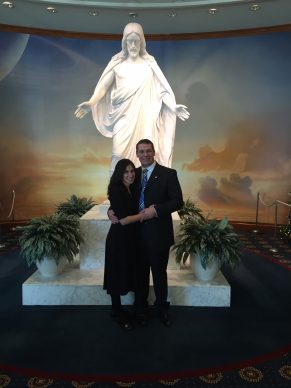
I personally feel like I’m going to be ok. I am more worried about Hawk, when I see him again. About three months after Hawk died, the stake president came over and he said that we can’t judge somebody and their state of mind when they do that, and it doesn’t negate any covenants that they’ve made. But I do still have a hard time wrapping my head around it. I think Patrick would like us to know what we’re supposed to do, but we have gone to the temple and will just wait for revelation for us.
What have you learned about yourself through this process.
I learned that first, we can never predict what is going to happen in life. When Hawk died, it was so shocking. I never thought that this would happen to me. Never. I realized that I can get through and persevere and come out stronger. You don’t know until you go through it how strong you can be. Like I said, I made a goal that I wouldn’t let Hawk’s decision, although he wasn’t in his right mind, diminish the rest of my life. I am going to make the rest of my life full of good things, as well as for my children. I am so worried about them, that they will in some way be messed up. But as they are getting older, I feel more at peace like they’re going to be ok. I think that has to do with the decisions we’ve made and that we do go to church and we teach them to have faith and they have this great dad, Patrick, who uses his priesthood and is there for them. It’s wonderful.
What are your feelings toward Red Hawk at this point?
I think that even five years later, I’m still processing what happened. I may never really settle on one emotion and it probably fluctuates between sadness and anger. Because we believe that life goes on after this, I feel that, in a sense, he has been trying to help from the other side. In a way, I feel like he’s trying to redeem himself and still be there. I’ve had many spiritual experiences where I’ve felt that is what’s happening. I feel like when you lose a loved one, you are more sensitive to those prompting from the other side. It’s kind of a constant, like you value life more every day. I am blessed with this new life, but I wouldn’t be here if it wasn’t for what I went through. I do feel like I’m right where I’m supposed to be.
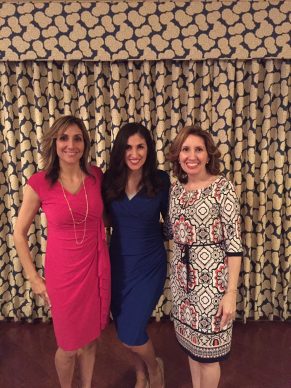
Deborah with her sisters
How has the experience with suicide affected your family members beyond your children?
It has affected all of my family members, but I’ll talk about my two amazing sisters. I think all of us had a little bit of post traumatic stress, and my way of moving forward was doing things that bring me joy, making new memories with my girls, finding love again.. My oldest sister Rebecca was very affected by Hawk’s death and over the last couple years has become very much involved in suicide support groups in her hometown in North Carolina. She’s become a group counselor/mediator and has also become a suicide crisis line counselor. She’s also chaired suicide awareness walks, so we support her in doing that. She also has five kids. My other sister Sarah has six kids. I always thought she could be a doctor, She was a stay-at-home mom for about 18 years. She decided she wanted to help people in their worst moments, so she became an EMT. She went to night school, trained as a paramedic, went to fire academy, and is now a firefighter at the age of 42. She has done everything to balance her home and new career. She is a godsend to people in their worst moments.
So it’s amazing and so sad that Hawk’s death has awakened everyone and made us more aware, but good is happening because of that. We’ll never be the same.
At A Glance
Name: Deborah Soderholm
Age: 36
Location: Williamsburg, Virginia
Marital History: Widowed, now remarried for 3 years
Occupation: Prior high school teacher, now a stay-at-home mom and part-time museum program guide
Convert to church?: my parents are converts and I was raised a member
Schools attended: Brigham Young University, University of Oxford
Favorite Hymn: Be Still My Soul
Interview Produced by Nollie Haws
